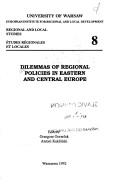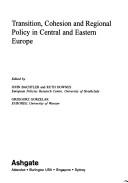| Listing 1 - 10 of 19 | << page >> |
Sort by
|
Book
ISBN: 0429835272 0429450966 0429835280 Year: 2019 Publisher: Abingdon, Oxon ; New York, NY : Routledge,
Abstract | Keywords | Export | Availability | Bookmark
 Loading...
Loading...Choose an application
- Reference Manager
- EndNote
- RefWorks (Direct export to RefWorks)
The integration of post-socialist Central and Eastern Europe into the EU is one of the success stories of European development. The region has seen significant economic convergence, dramatic changes in socio-economic indicators and improvements in the natural environment. However, some challenges remain, such as political divergence, public governance issues and population demographics. This book identifies and analyses the key post-1990 developments across the New Member States at the sub-national and national levels, with frequent country-level and regional comparisons. Careful attention is paid to drawing out commonalities in development trajectories while appreciating each country's unique context. Drawing on the academic literature and illuminating empirical material, the broad range of topics discussed in the book paints a detailed picture of both change and stability in Central and Eastern Europe. It will be valuable reading for advanced students, researchers and policymakers in regional studies, European studies, human geography, political economy and transition economics.
Post-communism --- Europe, Eastern --- Europe, Central --- Economic conditions --- Social conditions
Book
Year: 2020 Publisher: Luxembourg : European Investment Bank,
Abstract | Keywords | Export | Availability | Bookmark
 Loading...
Loading...Choose an application
- Reference Manager
- EndNote
- RefWorks (Direct export to RefWorks)
Countries and regions in Central and Eastern Europe (CEE) have gone through several challenges. They went through totalitarian and authoritarian communist regimes, gained independence at the end of the 19th century, faced new economic and political challenges and rejoined Europe in a perspective of mutual development. As different as they may be, despite recent populist movements, the CEE countries have much in common and regional policies can help the "forgotten places" to explore their opportunities, supporting democracy, cohesion, and local economies in the European Union. Grzegorz Gorzelak is a professor of economics, specialising in regional and local development policies and strategy building. He has collaborated with the World Bank, the OECD, DG Regio of the European Commission, several agencies of the Polish and Ukrainian governments, as well as regional and local authorities. This is the fourteenth essay in the Big Ideas series created by the European Investment Bank.
Europe --- Europe, Central --- Europe, Eastern --- Economic integration. --- Economic conditions.
Book
Year: 2020 Publisher: Luxembourg : European Investment Bank,
Abstract | Keywords | Export | Availability | Bookmark
 Loading...
Loading...Choose an application
- Reference Manager
- EndNote
- RefWorks (Direct export to RefWorks)
Countries and regions in Central and Eastern Europe (CEE) have gone through several challenges. They went through totalitarian and authoritarian communist regimes, gained independence at the end of the 19th century, faced new economic and political challenges and rejoined Europe in a perspective of mutual development. As different as they may be, despite recent populist movements, the CEE countries have much in common and regional policies can help the "forgotten places" to explore their opportunities, supporting democracy, cohesion, and local economies in the European Union. Grzegorz Gorzelak is a professor of economics, specialising in regional and local development policies and strategy building. He has collaborated with the World Bank, the OECD, DG Regio of the European Commission, several agencies of the Polish and Ukrainian governments, as well as regional and local authorities. This is the fourteenth essay in the Big Ideas series created by the European Investment Bank.
Europe --- Europe, Central --- Europe, Eastern --- Economic integration. --- Economic conditions.
Book
ISBN: 9783940755070 Year: 2008 Publisher: Leverkusen Opladen ; Farmington Hills, MI : Budrich UniPress,
Abstract | Keywords | Export | Availability | Bookmark
 Loading...
Loading...Choose an application
- Reference Manager
- EndNote
- RefWorks (Direct export to RefWorks)
City planning --- Regional planning --- Community development, Urban --- Cities and towns --- Urban policy --- Sociology, Urban --- Urbanisme --- Aménagement du territoire --- Développement communautaire urbain --- Villes --- Politique urbaine --- Sociologie urbaine --- Musil, Jiří,
Book
Year: 1987 Publisher: Warszawa University of Warsaw. Institute of space economy
Abstract | Keywords | Export | Availability | Bookmark
 Loading...
Loading...Choose an application
- Reference Manager
- EndNote
- RefWorks (Direct export to RefWorks)

ISBN: 8390028387 Year: 1992 Publisher: Warszawa University of Warsaw
Abstract | Keywords | Export | Availability | Bookmark
 Loading...
Loading...Choose an application
- Reference Manager
- EndNote
- RefWorks (Direct export to RefWorks)
Book
Abstract | Keywords | Export | Availability | Bookmark
 Loading...
Loading...Choose an application
- Reference Manager
- EndNote
- RefWorks (Direct export to RefWorks)
Book
ISBN: 9286147260 9789286147265 Year: 2020 Publisher: [s.l.] : European Investment Bank,
Abstract | Keywords | Export | Availability | Bookmark
 Loading...
Loading...Choose an application
- Reference Manager
- EndNote
- RefWorks (Direct export to RefWorks)
Countries and regions in Central and Eastern Europe (CEE) have gone through several challenges. They went through totalitarian and authoritarian communist regimes, gained independence at the end of the 19th century, faced new economic and political challenges and rejoined Europe in a perspective of mutual development. As different as they may be, despite recent populist movements, the CEE countries have much in common and regional policies can help the "forgotten places" to explore their opportunities, supporting democracy, cohesion, and local economies in the European Union. Grzegorz Gorzelak is a professor of economics, specialising in regional and local development policies and strategy building. He has collaborated with the World Bank, the OECD, DG Regio of the European Commission, several agencies of the Polish and Ukrainian governments, as well as regional and local authorities. This is the fourteenth essay in the Big Ideas series created by the European Investment Bank.
Business & Economics / Economics --- Economics --- Economic theory --- Political economy --- Social sciences --- Economic man
Book
ISBN: 9788373834361 Year: 2010 Publisher: Warszawa Wydawnictwo Naukowe Scholar
Abstract | Keywords | Export | Availability | Bookmark
 Loading...
Loading...Choose an application
- Reference Manager
- EndNote
- RefWorks (Direct export to RefWorks)
Public finance --- Business cycles --- Eastern and Central Europe

ISBN: 1840147830 Year: 2000 Publisher: Aldershot Ashgate
Abstract | Keywords | Export | Availability | Bookmark
 Loading...
Loading...Choose an application
- Reference Manager
- EndNote
- RefWorks (Direct export to RefWorks)
International relations. Foreign policy --- International economic relations --- Eastern and Central Europe --- Regional planning --- Aménagement du territoire --- European Union. --- European Union countries --- Pays de l'Union européenne --- Economic policy. --- Politique économique --- Aménagement du territoire --- Pays de l'Union européenne --- Politique économique
| Listing 1 - 10 of 19 | << page >> |
Sort by
|

 Search
Search Feedback
Feedback About UniCat
About UniCat  Help
Help News
News